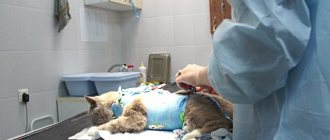7145Administration
Veterinarians recommend sterilizing cats between the ages of eight months and one year, since surgery performed before puberty threatens the animal’s health with complications. Few owners decide to take an older kitten to the doctor, especially if obvious signs of puberty do not appear. However, sooner or later nature will make itself felt, and then the owner will be faced with the question of whether it is possible to castrate an adult cat.
Why castrate an adult cat?
An adult non-neutered cat can “get” everyone in the household with its behavior
A non-castrated adult cat, having already experienced the joys of intimate life, will not give peace to anyone in the house, demanding a cat. Read more in the material: “Why cats are neutered: pros and cons, reviews from owners.”
He will leave terrible smelling marks everywhere, tear up furniture, show aggression towards his owners and strive to be free with all his might, and will not calm down until he gets his way - and after a short time everything will repeat itself.
What is special about castration of an adult cat?
During an operation to castrate an adult cat
Castration of an adult cat is no different from castration of a kitten under one year old: the testicles are removed in the same way through a small incision in the scrotum.
But many owners of adult cats decide with great caution to visit a veterinarian about this. Firstly, it seems to them that they are inflicting indelible moral trauma on their pet, depriving it of the opportunity to reproduce. Secondly, it is believed that the age limit for castration of an adult cat is 7 years .
However, in practice, veterinarians often castrate animals over 7 years of age and perform other, more complex operations on them, and mostly everything goes well. And attributing moral torment to cats has no basis.
Castration of cats over 7 years of age is sometimes prescribed for medical reasons: tumors, prostatitis, hormonal disorders, serious trauma to the genital organs.
Bengal seven year old cat. He gave excellent offspring, but according to doctors, he had to be castrated.
Older stud cats who have already made their contribution to the breed and are no longer involved in matings are also castrated. It is better to make such a decision together with the club management and a veterinarian you know.
Possible consequences of castration of older animals
The most common negative effect of the operation in this case is a constant increase in body weight, in some cases leading to the development of severe obesity. Why does this happen? The fact is that by the age of four the body’s biochemistry is already fully formed. If a cat grew up “integer”, without castration, then his body is already “accustomed” to spending considerable amounts of energy and nutrients to ensure the functioning of the reproductive system.
Thus, after castration, the cat’s energy needs change significantly towards their reduction. If this is not taken into account when preparing the animal's daily diet, your pet will inevitably turn into something spherical. Therefore, even before castration, you should consult a veterinarian. He will help you create the most suitable diet, based on the weight, breed, and physiological state of the animal.
We strongly advise against giving castrati fish (sea or river – it doesn’t matter). Firstly, despite established misconceptions, this food is not natural for cats. Secondly, a fish diet in castrated animals often leads to the development of urolithiasis.
The same can be said about dry food. You can feed them with high-quality food, but not all the time. Three to four times a week, no more. At the same time, the pet should always have unlimited access to clean drinking water. The rest of the time you need to give preference to “natural”. Note that neutered cats have a noticeably lower protein requirement, and their excess also leads to an increased risk of developing urolithiasis. So it is recommended to use a small amount of boiled chicken or lean offal as a source of protein.
If you don’t have time to count calories in your cat’s diet, we recommend purchasing special commercial food. Many manufacturers have long been producing complete mixtures designed specifically for feeding castrates. They have a balanced content of nutrients, micro- and macro-substances, as well as vitamins. This pleasure is not cheap, but when using them you can be sure that nothing threatens your cat’s health. True, such feeds should not be used from time to time, but constantly, otherwise there will be no effect from their use.
How to prevent obesity in a neutered cat?
Thus, avoiding the negative consequences mentioned above is quite simple - feed your pet high-quality food, do not overfeed, and provide the cat with unhindered access to clean drinking water. Then everything will be alright. This, by the way, applies to all cases of castration; age does not matter here.
In addition, you need to encourage your cat to play actively. Buy more active toys, and don’t be shy about playing with your pet from time to time.
More movement means less weight gain. If you live in a city apartment, take your pet out of town during the summer. An active lifestyle and long walks will have a beneficial effect on his health. Moreover, the cat will no longer be interested in cats, and therefore he will not run away from home.
Will the cat survive such an operation?
The main reason for caution is the health of the animal.
Before castrating an adult cat, a medical examination is required!
Whether the pet's heart can withstand this is a decisive question. A conscientious specialist will definitely send him for a cardiogram before starting to prepare the cat for surgery. It is also important to predict how the cat will tolerate anesthesia.
There are cases of anesthesia intolerance among both adults and young animals.
It is quite difficult to predict this, but one way or another you will have to rely on the conclusion of a cardiologist, and in addition to this, you can do an allergy test. Kidneys - their condition is also carefully checked and assessed: in cats they are, in principle, very vulnerable, and especially in adult cats.
Consequences of castration
Most likely, the instincts of an adult cat are registered in memory. After castration, the cat can continue to mark, only with urine.
The sexual habits of an adult cat can, if not nullify, then greatly complicate the process of restructuring the functioning of his body. An adult cat has probably already mated with cats, so it is not possible in all cases to suppress sexual instincts using castration .
Often such cats continue to mark urine in the house, hiss at their owners and defecate on furniture even several months after removal of the testes. The older the animal, the longer the period of attenuation of sexual instincts.
Many owners, seeing that the problem has not been resolved within a few days, may begin to blame the veterinarian, although the reason lies in the physiology of the adult animal. Sex hormones are produced not only by the testicles, but also by the pituitary gland . Of course, surgery on the pituitary gland is not performed for this purpose.
Age for castration
Puberty of cats occurs between 8 months and one year. At this time, the animal begins to produce sex hormones. Under their influence, the cat begins to mark its territory, imitate sexual intercourse and demand a “bride”. It is best to do castration between 7 months and a year. During this period, the animal’s body is already fully formed. If castration is done earlier, problems with urination will appear, since the urethra will not develop.
Is it possible to castrate a cat after mating? Yes, but the result may be unexpected. The fact is that while the animal is still a virgin, the body is constantly producing testes. After mating with a cat, the pituitary and adrenal glands begin to produce them.
Therefore, it is possible that the pet’s behavior after the operation will remain the same, but the cat will simply become infertile. According to statistics, ten percent of animals behave as before surgery.
Some cats are dangerous to neuter. The operation can cause irreparable harm to the health of the animal if the procedure is performed in adulthood (8 years and older). The cat’s body may not accept anesthesia or react negatively to it.
© shutterstock
Contraindications to castration
The presence of chronic diseases, depending on their severity, may be a contraindication to castration.
An adult cat may suffer from chronic diseases for which surgery is contraindicated.
Organic pathologies, sluggish chronic viral infections, epilepsy, diabetes - if the cat has a serious diagnosis, then the owners will either have to abandon surgical castration in favor of an alternative, or contact the most highly qualified specialists.
What tests need to be taken when preparing for castration?
For an adult cat, preliminary examinations of the health status before castration are especially important, since they help identify pathologies of the body that may be contraindications for surgery.
At the same time, the doctor will take an anamnesis, i.e. will summarize data on previous illnesses, medications taken, disorders in the functioning of the gastrointestinal tract and genitourinary system. The specialist also receives data on body temperature, heartbeat, number of breaths and exits per minute, thus making a conclusion about the condition of the lungs and heart, and then makes a general visual examination of the animal’s physical health.
© shutterstock
Along with antihistamine therapy, an adult unneutered cat undergoes several other tests, for example:
- biochemical blood test - prescribed to cats with poor appetite, weakened, or hair loss, this test helps to identify diseases of the internal organs - kidneys, liver, etc.;
- echocardiography or electrocardiogram – if there is a suspicion of cardiovascular disease;
- general blood test - can detect parasites in the blood, as well as the presence of inflammatory processes and enzyme deficiency;
- Ultrasound of the abdominal cavity;
- urine test - usually done immediately before surgery, 2-3 hours in advance, since acidity changes during this time, this type of study helps to identify inflammation in the urinary tract, as well as diagnose kidney disease.
Preparing for surgery and caring for the animal after it
A cat can be castrated only after the necessary tests have been completed. It is important to remember that all surgical operations, except the most emergency ones, are performed only on an empty stomach.
You can no longer feed 12 hours before surgery, and drink 3 hours before!
The last meal before going under anesthesia should be at least 12 hours before. Water is stopped three hours before surgery. All this is important in order to prevent vomiting and the entry of vomit into the animal’s respiratory tract.
During the postoperative period, the owner must monitor the general condition of the cat, prevent it from hypothermia, provide enough water, feed it only when it has fully recovered and asks to eat, monitor the emptying of its bladder and intestines, and not allow it to hide in secluded corners.
If the suture begins to bleed , becomes inflamed, and the cat clearly becomes worse, you should urgently contact a veterinarian. You can allow the cat to lick the stitches on the second day; after the operation it is better for him to wear a special collar.
Misconceptions about surgery
Castration of cats has pros and cons, but opinions about the operation and its consequences are largely erroneous. Many owners are confident that removing the testes is not only a painless, but also safe procedure. This is a false belief. Without anesthesia, the animal will not survive the operation due to pain. In addition, animals, like people, are not immune from complications.
It is believed that castrated cats, after removal of the testes, are deprived of vital sexual intercourse, so owners are opposed to the operation.
If the cat is not provided with constant “sex”, it will be more painful and unnatural for him, since it is inherent in the genes by nature. This is a natural physical attraction, during which animals simply make certain body movements, but they do not get the same pleasure from it as people do.
Why is surgery done and is it necessary? In Russia this issue is still controversial. In Europe, this castration has long been a common procedure. It helps save people and pets from many unnecessary problems. After surgery, the animal will live calmly and for a long time.
Castration is one of the most popular reasons for visiting veterinary clinics around the world. Veterinarians themselves believe that the optimal time for the operation is before the age of one year. If the procedure is performed later, the risk of developing side effects increases, and the body of “over-aged” animals tolerates it less well. But what if you need to castrate a cat at 4 years old? Is it possible to do this, and is the procedure dangerous for the health and life of your pet?
Experience of mass castration and sterilization of stray animals
Volunteer practice in many cities shows that there should be no serious consequences after castration.
After all, it is mainly adult, sexually mature animals that are castrated, limiting the increase in the street population. Many veterinarians associated with volunteers primarily engage in castration and sterilization, as they say, on-line. All cats and cats operated by them successfully recover from anesthesia and either return to their usual environment or are sent to foster care with subsequent placement.
Character and temperament
Is it possible to castrate a cat at 5 years old if the only problem is his playfulness and mobility? No, in this case it is better to leave everything as is. It is a myth that after removal of the testes the animal becomes calm and sleepy. Just like people, cats have different personalities and temperaments. If your pet is active and playful by nature, then it will not become a sofa ottoman.
Of course, it is better to do everything on time. Performed at an early age, this operation is easier for animals and does not threaten any complications. The optimal age is 7 months - 1 year. By this time, the pet has completed its maturation and formation. If the operation is performed earlier, the genitourinary system will remain underdeveloped. As a result, there will be a high chance of developing urolithiasis. Veterinarians usually recommend 9 months of age.
Is it possible to castrate an adult cat? Of course it is possible. But if he has already mated or has a bad habit of marking territory, which is also closely related to sex hormones, then castration may not solve the problem. In some cases, males continue to sing songs and leave marks, which, however, become less “fragrant.”
Undesirable consequences: how to avoid them
So, you turned to a qualified veterinarian, properly prepared and cared for your pet. The operation is over and the patient feels well.
What should you pay attention to to avoid unpleasant consequences?
There is an opinion that the most common complication of castration is urolithiasis (UCD).
This is not entirely true: there is no direct relationship between castration and ICD. This disease is a consequence of impaired metabolism and most often occurs in animals with excess body weight.
Therefore, proper nutrition is the key to the health of your animal, and this applies not only to ICD. Diseases of the cardiovascular system, digestive tract, and joints are the most common consequences of obesity.
Excess body weight occurs in both castrated and non-castrated animals and depends mainly on nutrition and a genetic predisposition to obesity. The fact is that with the elimination of the reproductive instinct, your cat begins to lead a more measured life: anxiety, aggression, and the associated decrease in appetite during the hunt disappear. Therefore, if the animal is prone to obesity, weight gain will occur faster after castration.
This is why it is very important to approach feeding responsibly. For castrated animals, there are special dietary foods that are sold in veterinary pharmacies, and regarding the use of which, you can always consult the seller. Your veterinarian will give you more detailed advice on feeding and maintenance.
General information about the procedure
Castration of a cat is an operation to remove the testes and suppress the sexual function of the pet.
There are several methods for carrying out the procedure:
- Surgical (or classical). Most cat owners in Russia resort to this method of castration.
- Chemical. A chemical composition is injected into the testes. It destroys the glands, and they are replaced by connective tissue elements. Veterinarians consider this method simple and cheap. However, it has not yet found application in Russia.
- Medical sterilization is the implantation of implants under the skin of a cat. They secrete a drug that completely suppresses the cat’s sexual function. This type of castration is not cheap, but it is absolutely safe for your pet’s health.
- Radiation castration. The cat's testes are placed under a source of gamma radiation to suppress sexual function. The method is reliable, safe for the health of the animal and simple in technique. To carry it out, you will need special equipment, which is not available in all clinics, so the cost of the procedure will be high. Complications are extremely rare. In addition, the cat does not need to undergo either general anesthesia or local anesthesia.
Pros of the operation
Veterinarians believe that this procedure is necessary for animals that will not be used in breeding activities. The owner must study all the advantages of the operation and possible consequences and make an independent decision.
Benefits of the procedure:
- increasing the life expectancy of a pet;
- reducing the risk of developing oncology and diseases of the genitourinary system;
- the pet’s character becomes more balanced;
- getting rid of obsessive and loud meowing;
- cats no longer mark territory;
- suppressing the cat's desire to run away from home in search of a partner.
Negative consequences
During or after the procedure, your pet may experience various complications:
- sudden weight gain due to a slowdown in metabolism in the body;
- development of urolithiasis;
- suture infection;
- pain at the incision site;
- bleeding from the suture;
- disruption of the gastrointestinal tract.
Castration can be fatal, so the operation is prohibited for cats with the following diseases:
- renal failure;
- urolithiasis disease;
- cardiopulmonary failure;
- liver diseases.
Important! Sometimes neutered cats continue to mark their territory after the procedure.
How much does it cost to castrate a cat?
How much it costs to castrate a cat depends on a number of factors:
- clinic level;
- castration method;
- complexity of the operation (simple removal of the testes, removal of a tumor, etc.);
- type of anesthesia;
- care after the intervention (pet’s stay in the clinic, complications that arise, etc.);
- therapy before and after surgery (administration of immune serums, the need for antibacterial agents, immune, restorative drugs).
On average, the price for castration is in the range of 900-1500 rubles. In some clinics, the cost of the service reaches 7000-8000 rubles or more.
Technique of the operation
Surgical castration itself does not cause any particular problems. An experienced veterinarian performs this procedure in 10-15 minutes, taking into account the time spent preparing for the operation.
The specialist determines which anesthesia technique to use in a particular case: whether local anesthesia is enough, or whether general anesthesia is required. Then all the necessary medications are administered, and the pet is fixed in a special restraint device. If you decide to castrate your cat under local anesthesia, it doesn’t hurt to double check the strength of the clamps. If the cat breaks out in the middle of the operation, nothing good awaits him.
While the anesthetics are in effect, the preparatory part of the work is carried out: the hair on the operating area is carefully clipped and, if possible, shaved. You should not allow anything “foreign” to get into the wound canal, as this leads to the development of purulent inflammation. Then the skin is treated at least twice with antiseptic compounds. It is not necessary to use any “special” means for this purpose: ordinary iodine or potassium permanganate is perfect.
About the types of castration
It is generally accepted that castration is exclusively a surgical operation, the meaning of which is to remove the testes, but this is not so.
Yes, surgery is indeed used most often due to its high efficiency, simplicity and low cost, but there are still several types of this procedure:
- Classic surgical castration , which will be discussed in more detail below.
- Drug sterilization , in which an implant is sewn under the skin of the animal, gradually releasing drugs. They suppress the cat's libido. The method is convenient, but very expensive. In addition, in recent years, veterinarians increasingly believe that medical hormonal castration can have an extremely detrimental effect on the health of pets in the future.
- Chemical castration. In this case, special chemicals are injected directly into the testis. The organ degrades from the action of drugs, its tissues are replaced by connective tissue “patches”.
- Radiation sterility. The testes are irradiated under a source of directed gamma radiation. This technique is considered the most advanced today, since the risks of complications are completely absent, and the cat’s sexual function is reliably suppressed.
But still, the last three of the methods we described have not received much widespread use in our country. More than 90% of veterinary clinics still practice this particular method of deworming, and therefore it is necessary to talk about it in more detail. Moreover, for a three-year-old cat, surgical castration is ideal; negative consequences develop extremely rarely.
This is interesting: How to properly feed a castrated cat
Castration of a cryptorchid cat
One of the hereditary diseases of cats is cryptorchidism. In an animal cryptorchid, during intrauterine development, the testicle (one or both) does not descend into the scrotum. Their location in the groin area serves as an indication for castration, as it poses a threat to the health of the pet (for example, the formation of malignant tumors).
Castration for diagnosed cryptorchidism will cost the cat owner more than a regular operation. If the veterinarian cannot identify the location of the abnormal testicle by palpation, an ultrasound scan is prescribed. In any case, during castration, both appendages should be removed, since the remaining one will produce hormones and the animal’s behavior will not change.
Why did I pee in the mistress’s shoes...
Possible complications in a cat after surgery
During the first time after castration of a cat, the following may occur:
- minor bleeding from the wound, which stops on the same day and does not pose a threat to the animal’s life;
- inflammation of the scrotum, which causes swelling of the tissue around the wound, an increase in local temperature, lethargy, and poor appetite;
- abscess as a result of infection of the wound (a high risk of infection is observed if you let the operated cat go for a walk in the first days after castration).
To minimize the development of side effects, you need to carry out mandatory antiseptic wound treatments daily (the first 2-3 days), do not let the cat outside and keep the litter tray clean.
If castration was performed on a 6-8 month old kitten, then in the postoperative period it is important to protect it from communication with uncastrated cats in order to avoid conflict situations and allow the young, weakened body to recover.
When castrating cats (when the uterus is not removed), the worst consequence may be the early development of oncological processes, which will lead to the death of the animal. This is why veterinarians prefer ovariohysterectomy (removal of the cat's ovaries, uterus and oviducts).
Methods of cat castration
Modern veterinary medicine offers two methods of castration of cats: surgical and chemical. Most often they resort to the first option. If anesthesia is contraindicated for an animal, then a chemical or medicinal method can be used.
Surgical castration
Surgical castration is carried out according to the following algorithm.
- Administration of anesthesia to the animal.
- Removal of hair in the scrotum area.
- Treating the surgical field with an antiseptic.
- Cutting the skin.
- Separation of the testis from neighboring tissues and removing it from the wound.
- Ligation of the spermatic cord - its ligation with a special suture material (prevents blood loss).
- Cutting off the testis.
- Antiseptic treatment.
Sutures are not required. The incision site begins to heal on its own in the first days after the operation, and by the beginning of the second week the wound heals completely.
Chemical castration
Chemical castration is the subcutaneous injection of a medicinal hormonal substance into a cat. The method is reversible; after removal of the implant or expiration of its validity period, the ability to fertilize is restored. The duration of activity of the active ingredient is about 6 months, in some cases up to 1.5-2 years.
In addition to the need for periodic administration of medication, medical castration has other features. For example, veterinarians note the presence of a reverse effect during the initial period of implant installation. The animal begins to make sounds with redoubled force, marks more often, and becomes more nervous and irritable. This phenomenon is due to the mechanism of action of the drug: neuro-endocrine reactions are first sharply enhanced, and then just as sharply inhibited.
The chemical method of castration of a cat is not suitable if the animal is completely healthy, there is no need for procreation, and the operation itself aims to normalize the pet’s behavior. At the same time, you should choose it if the cat has contraindications to surgery or if mating is planned in the future.
Indications for the procedure
Castration of an adult cat can also be carried out for medical reasons, and not just because the cat is marking. Such indications include: neoplasm of the testes and/or scrotum (in such cases, castration is carried out with removal of the scrotum); hormonal disorders; cryptorchidism. In some articles, prostatitis is indicated as a medical indication. In cats, the prostate is rudimentary (which is not visible on ultrasound) and does not cause prostatitis in cats. Advantages and disadvantages
On the positive side:
- the sharp unpleasant smell of urine disappears;
- stops marking. But if the animal has been marking a certain area at home for a long time, the habit will remain. aggression caused by hormonal levels disappears;
- cats living in summer cottages will no longer need to “fight” for territory.
- tendency to obesity;
- decreased activity, but not for everyone;
- what you need to know before the procedure.
Feeding a neutered cat
Cats after castration need to change their usual feeding diet due to the fact that after a restructuring of metabolism, the need for energy will decrease by 25%.
If the cat is on natural feeding (meat, fish, dairy products, porridge), then it is worth reducing the amount of fatty food or reducing the portion.
When feeding commercial food, it is wiser to switch to a preventive diet marked “for castrated and sterilized cats.” In addition, they affect genitourinary function and help prevent various ailments.











